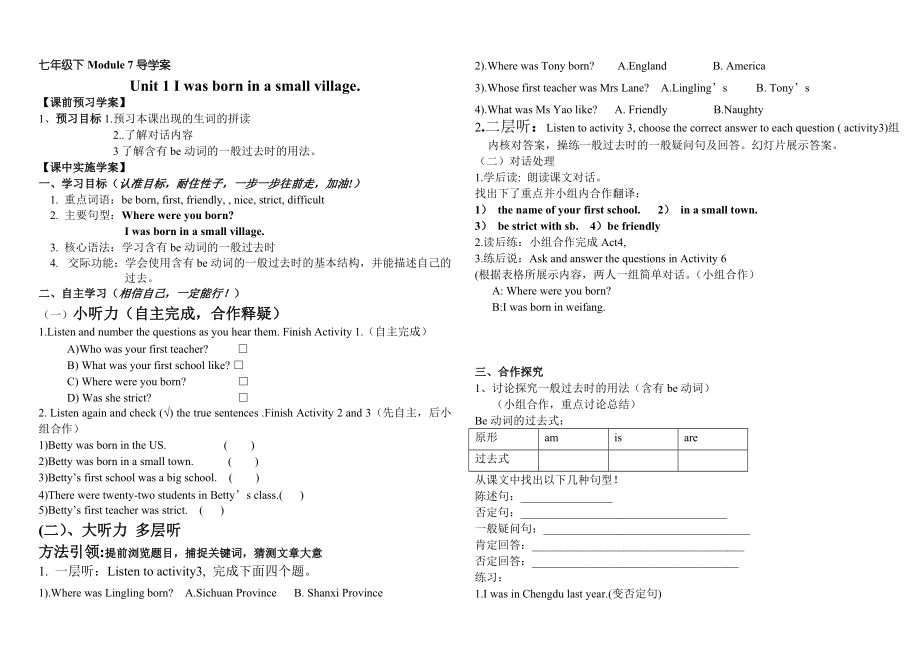《七年級(jí)英語(yǔ)外研版下Module7Unit1導(dǎo)學(xué)案》由會(huì)員分享�,可在線閱讀,更多相關(guān)《七年級(jí)英語(yǔ)外研版下Module7Unit1導(dǎo)學(xué)案(3頁(yè)珍藏版)》請(qǐng)?jiān)谘b配圖網(wǎng)上搜索�����。
1��、
七年級(jí)下Module 7導(dǎo)學(xué)案
Unit 1 I was born in a small village.
【課前預(yù)習(xí)學(xué)案】
1��、 預(yù)習(xí)目標(biāo)1.預(yù)習(xí)本課出現(xiàn)的生詞的拼讀
2..了解對(duì)話(huà)內(nèi)容
3了解含有be動(dòng)詞的一般過(guò)去時(shí)的用法��。
【課中實(shí)施學(xué)案】
一��、學(xué)習(xí)目標(biāo)(認(rèn)準(zhǔn)目標(biāo)�����,耐住性子�,一步一步往前走�����,加油!)
1. 重點(diǎn)詞語(yǔ):be born, first, friendly, , nice, strict, difficult
2. 主要句型:Where were you born?
I was
2�����、 born in a small village.
3. 核心語(yǔ)法:學(xué)習(xí)含有be動(dòng)詞的一般過(guò)去時(shí)
4. 交際功能:學(xué)會(huì)使用含有be動(dòng)詞的一般過(guò)去時(shí)的基本結(jié)構(gòu),并能描述自己的過(guò)去��。
二����、自主學(xué)習(xí)(相信自己,一定能行?����。?
(一)小聽(tīng)力(自主完成�����,合作釋疑)
1.Listen and number the questions as you hear them. Finish Activity 1.(自主完成)
A)Who was your first teacher? □
B) What was your first school like? □
3�����、 C) Where were you born? □
D) Was she strict? □
2. Listen again and check (√) the true sentences .Finish Activity 2 and 3(先自主�����,后小組合作)
1)Betty was born in the US. ( )
2)Betty was born in a small town. ( )
3)Betty’s first school was a big school. (
4、 )
4)There were twenty-two students in Betty’s class.( )
5)Betty’s first teacher was strict. ( )
(二)����、大聽(tīng)力 多層聽(tīng)
方法引領(lǐng):提前瀏覽題目,捕捉關(guān)鍵詞�����,猜測(cè)文章大意
1. 一層聽(tīng):Listen to activity3, 完成下面四個(gè)題��。
1).Where was Lingling born? A.Sichuan Province B. Shanxi Province
2).Where was Tony born? A.England B.
5����、 America
3).Whose first teacher was Mrs Lane? A.Lingling’s B. Tony’s
4).What was Ms Yao like? A. Friendly B.Naughty
2.二層聽(tīng):Listen to activity 3, choose the correct answer to each question ( activity3)組內(nèi)核對(duì)答案,操練一般過(guò)去時(shí)的一般疑問(wèn)句及回答�����?��;脽羝故敬鸢?�。
(二)對(duì)話(huà)處理
1.學(xué)后讀: 朗讀課文對(duì)話(huà)。
找出下了重點(diǎn)并小組內(nèi)合作翻譯:
1) the
6�、 name of your first school. 2) in a small town.
3) be strict with sb. 4)be friendly
2.讀后練:小組合作完成Act4,
3.練后說(shuō):Ask and answer the questions in Activity 6
(根據(jù)表格所展示內(nèi)容,兩人一組簡(jiǎn)單對(duì)話(huà)。(小組合作)
A: Where were you born?
B:I was born in weifang.
三�、合作探究
1、討論探究一般過(guò)去時(shí)的用法(含有be動(dòng)詞)
(小組合作���,重點(diǎn)討論總結(jié)
7����、)
Be動(dòng)詞的過(guò)去式:
原形
am
is
are
過(guò)去式
從課文中找出以下幾種句型�����!
陳述句:________________
否定句:____________________________________
一般疑問(wèn)句:____________________________________
肯定回答:_____________________________________
否定回答:____________________________________
練習(xí):
1.I was in Chengdu last year.(變否定句)
_____
8��、___________________________________
2.He was an old teacher.(變疑問(wèn)句并作肯定和否定回答)
____________________________________
——————————————————
四�、歸納提升
【精講點(diǎn)撥】
1.含有be動(dòng)詞的一般過(guò)去時(shí).
2.born, ?v. 出生(動(dòng)詞bear的過(guò)去了分詞) be born 意為”出生于”,一般只用于過(guò)去時(shí)態(tài).be born后接時(shí)間或地點(diǎn)狀語(yǔ).
Eg. When were you born? 你何時(shí)出生?
I was born on the 1
9、4th of May, 1986. 我生于1986年5 月14日.
3. strict. adj. 嚴(yán)格的,嚴(yán)肅的,嚴(yán)密的,嚴(yán)謹(jǐn)?shù)?
My mother is a strict teacher. 我媽媽是位嚴(yán)格的老師.
4. friendly. adj. 友好的.其名詞形式friend.
Friendly 的反義詞: unfriendly.
be friendly to sb. 意為 “對(duì)某人友好”
All the teachers in our school are very friendly to us.
【拓展】 be strict in與be stric
10��、t with.
be strict in 后接sth. 表示某事(學(xué)習(xí),工作等)嚴(yán)格要求.
be strict with 后接sb. 表示對(duì)某要要求嚴(yán)格.
Eg. our English teacher is strict in our study.
Our english teacher is strict with us.
【精練】用所給動(dòng)詞的適當(dāng)形式或根據(jù)漢意填空�。
1. Where were you _____________(bear).
2. We must be ________________(strict) with ourselves.
3. She
11、 was _______________(友好的)
(三)����、課堂小結(jié)(會(huì)思考、會(huì)總結(jié)��,才會(huì)有收獲哦!)
通過(guò)本節(jié)課的學(xué)習(xí)��,你有哪些收獲�?還有哪些疑惑?
Happy text(比一比�����,看誰(shuí)做得既快又正確?���。?
學(xué)校:________ 姓名:________ 班級(jí):_________
A.用適當(dāng)?shù)慕樵~填空:
1. I was born ______ a small village.
2. What’s the name __________your city?
3. –What is your Chinese teacher ________ ?
-- V
12、ery strict but nice.
4. Can you write something ________ your past life?
B. 用be 的適當(dāng) 形式填空:
1. -- ________ tony born in Beijing?
--- No, he ____________.
2. –Where _______ they yesterday ?
---They __________in the library.
3. The city ______ very small in the past, but it _____ very big no
13���、w.
4. Lucy and Lily _____ born in 1989.
【課后延伸】
(一)復(fù)習(xí)鞏固:復(fù)習(xí)當(dāng)天所學(xué)內(nèi)容��,整理課堂筆記��,掌握新詞匯����、句型����。
(二)分層作業(yè):書(shū)寫(xiě)本課所學(xué)單詞及詞匯�����;完成課后練習(xí)題。
(三)預(yù)習(xí)任務(wù):預(yù)習(xí)本模塊其余的單詞����,要求能根據(jù)音標(biāo)讀出單詞,英漢互譯���。
Happy text(比一比�����,看誰(shuí)做得既快又正確?���。?
學(xué)校:________ 姓名:________ 班級(jí):_________
A.用適當(dāng)?shù)慕樵~填空:
1. I was born ______ a small village.
2. What’s the name __
14���、________your city?
3. –What is your Chinese teacher ________ ?
-- Very strict but nice.
4. Can you write something ________ your past life?
B. 用be 的適當(dāng) 形式填空:
1. -- ________ tony born in Beijing?
--- No, he ____________.
3. –Where _______ they yesterday ?
---They __________in the library.
3. The city ______ very small in the past, but it _____ very big now.
4. Lucy and Lily _____ born in 1989.
【課后延伸】
(一)復(fù)習(xí)鞏固:復(fù)習(xí)當(dāng)天所學(xué)內(nèi)容����,整理課堂筆記����,掌握新詞匯��、句型����。
(二)分層作業(yè):書(shū)寫(xiě)本課所學(xué)單詞及詞匯�����;完成課后練習(xí)題�����。
(三)預(yù)習(xí)任務(wù):預(yù)習(xí)本模塊其余的單詞���,要求能根據(jù)音標(biāo)讀出單詞��,英漢互譯����。
 七年級(jí)英語(yǔ)外研版下Module7Unit1導(dǎo)學(xué)案
七年級(jí)英語(yǔ)外研版下Module7Unit1導(dǎo)學(xué)案

